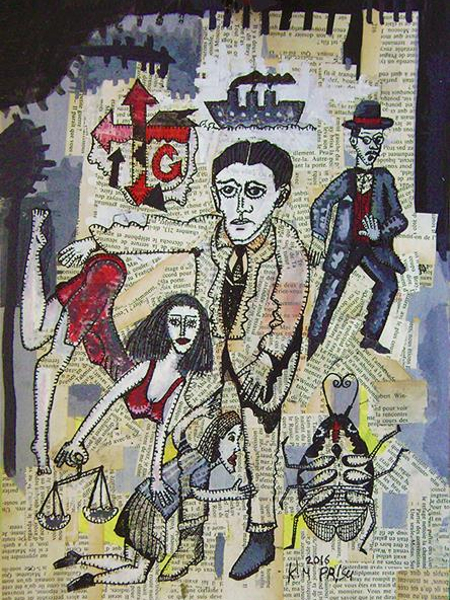Prague, in 2017 the fifth most visited city in Europe – which boasts an influx of both visiting tourists & long-term dwellers from abroad – has become a major market in English-language books, including both the imported original English publications (notice the thriving English sections of every major Prague bookshop) & Czech translations of foreign-language fiction. At Argo, the Gallimard of Czech publishing, writing in translation comprises 70% of the entire book production.
This of course should come as no surprise a century after this city became the capital of the newly established Czechoslovak state (in itself an internationalist project). Almost exactly a hundred years ago, Prague emerged from WW1 as the seat of one of the oldest & largest Jewish communities in Europe; as the home to the most influential group of German writers outside German-speaking countries; & as a city whose claim to internationalism & cosmopolitanism was emblematised by its first president, its first avant-garde, & its first train station (famously named afterWoodrow Wilson). There would have been no Prague Linguistic Circle without Russian formalists residing in the city, nor would there have been Prague Surrealism without Breton, Éluard & co. visiting & spreading the word.
Of course, the first three decades of internationalism & cross-cultural exchange were to be dampened (albeit never completely extinguished) by the following five decades of totalitarianism. Still, the most relevant Prague literature of primary interest remained a literature written by foreigners: in the guise, now, of those who had to flee the city (Blatný, Kundera, Škvorecký, Tigrid et al.).
Unsurprisingly, during the last two decades since the “Velvet Revolution” of 1989 (& indeed reaching even further back), Prague has also spawned a significant group of Anglophone writers. A century after Meyrink, Brod, Kisch, Kafka & company were giving expression & setting the tone for so much of 20th-century European fiction, another group of writers (this time Anglophone) is re-inscribing Prague within the international literary networks whose nodal point it used to form.
What therefore does come as a surprise is that this international community is barely visible in the Prague literary media; that it is meagrely supported by the culture industry; & that its reception, let alone a cross-cultural dialogue with it, is practically non-existent. Above all, there is no institutional recognition whatsoever of this community’s contribution to the cultural life of the city.
And yet, over the last twenty years, this community – irrespective of nationality – has spawned writers as diverse & important, both locally & internationally, as Lukáš Tomin, Alan Levy, Gene Deitch, Ian Milner, Joshua Cohen, Louis Armand, G.S. Evans, Holly Tavel, Clare Wigfall, Laura Zam, Vincent Farnsworth, Jim Freeman, Thor Garcia, Travis Jeppesen, Gwendolyn Albert, Věra Chase, Laura Conway, Stephan Delbos, Richard Katrovas, Toby Litt, Tom McCarthy, Maureen McManus, Phil Shoenfelt, Joshua Mensch, Ken Nash, Julie Ashley, Kevin Blahut, Pavla Johnsonová, Justin Quinn… And this is only naming a few.
Given how many Anglophone writers are or have been active in Prague, it is astonishing to realise how few of them have been reviewed, interviewed, or translated, not to mention recognised or awarded for their contribution, within the Czech-language Prague literary media. The discrepancy verges on the ridiculous when compared to their reception internationally: many of these are writers acknowledged elsewhere, reaping sales, amassing cultural capital, receiving awards, all of which is lost in the Czech cultural space where no-one seems to take notice. Even those writers whose work is explicitly, at times monumentally, celebratory of this city & who identify primarily as citizens of Prague – some of whom are even naturalised citizens of the Czech Republic. This omission is particularly absurd if one takes Alex Zucker’s word for it that in the USA there are “currently no Czech authors in demand” (obviously the adjective ‘Czech’ here belongs between quotation marks).
Explanations for this shocking phenomenon are hard to come up with. Given how many erstwhile “Czechs” read/speak English, how much the “Czech” publishing industry is underwritten by English-language books in translation, how much is happening in the literary landscape of this city that is by its nature international, the establishment’s disregard of Prague’s Anglophone scene reeks of fraudulence & is reminiscent of a wilful kind of censorship-by-omission. It’s high time this changed, & changed NOW.
Published by bibliofone.wordpress.com
published: 16. 10. 2017







